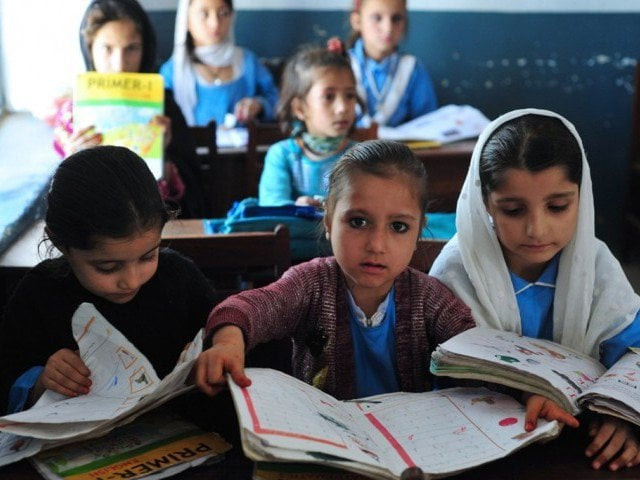For a better future: ‘Ilm’ ambassadors on a mission to discourage school dropouts
The programme, sponsored by the British Council, engages locals to increase enrollment in schools

The programme, sponsored by the British Council, engages locals to increase enrollment in schools. PHOTO: AFP
"The dropout rate, for whatever reason, is a big problem," he observes. "The poor parents prefer to employ their children to look after the livestock and the harvest of cotton and other crops to earn for the family and also so that they learn the trade of their ancestors."

Next in line are the schools where the teachers are not available, there is a complete dearth of facilities or the school building does not exist even though a school has been approved for that village. The defunct school management committees and their funding issues, irrelevant curriculum, teachers' attitude, delay in issuance of the General Register (GR) numbers and lack of extra-curricular activities, among others, are some other irritants.
"We have begun work with a holistic approach, especially focusing on the attendance of students and addressing the causes of dropouts through an adaptive approach," says Jamari, who heads a mohala committee in Matiari district. "Over the last year, our efforts have yielded some encouraging results as far as student retention is concerned."
Under the British Council's sponsored project, this committee is among nine formed by the non-profit Sindh Community Foundation (SCF) in Matiari and Tando Muhammad Khan districts. "These act like an umbrella consisting notable persons and youth, all taking up discrete tiers of responsibilities," says Javed Soz, the SCF's executive.
Mohala committees
The mohala committees comprise 9 to 11 members including active citizens, elders, parents and influential persons from the community. Some committees have expanded their membership to up to 17. Each covers several villages and schools.

Each active citizen is tasked to enrol and ensure retention of at least 10 students. More than 200 active citizens are engaged in the project in the two districts. The volunteers were given a four-day training. According to SCF, the project stipulates 80 per cent retention of the trained volunteers.
The idea
The concept has been introduced by the British Council. It engages the committees and under them a group of active citizens, who are also dubbed as ‘ilm’ ambassadors, for the purpose. The citizens are trained to mobilise the community for children's enrolment and returning the dropouts to schools, monitoring attendance and pursuing the parents whose children leave schools for economic reasons.
They also point out the absence or shortage of teachers in a school and lack of facilities to the committees, which lobby the education officials to address the problems.
According to Soz, since the project began in April, 2014, the volunteers enrolled and brought back over 2,700 students in Tando Muhammad Khan and around 1,600 in Matiari districts. They also helped reopen over half a dozen closed schools.
Although the volunteers were able to maintain an average of between 15 and 25 enrolment retention per school, in some instances the figures went up to between 80 and 100 in each school. The enrolment retention is being carried out in 120 schools of the two districts.
Finding a way out
"The children's labour adds to their family income. We know we can't stop them from working in the agriculture and livestock sectors. So we suggested the teachers to adjust the school timings so that the children can work while also acquiring education," says Muneer Bhutto, an active citizen of Hala Purano in Matiari Mohalla committee.
The teachers allow the students to go by 11am to 12 noon which enables them to join their parents in their labour.
Abdul Hussain Memon, a veterinarian who is volunteering as an active citizen, believes long-term coordination among the local stakeholders can work wonders. "This project has created a sort of community ownership of primary education in our villages. But we have to see if we can continue volunteering for it when the project ends."
According to Soz, the project will conclude by March, 2017.
Published in The Express Tribune, November 2nd, 2015.



















COMMENTS
Comments are moderated and generally will be posted if they are on-topic and not abusive.
For more information, please see our Comments FAQ